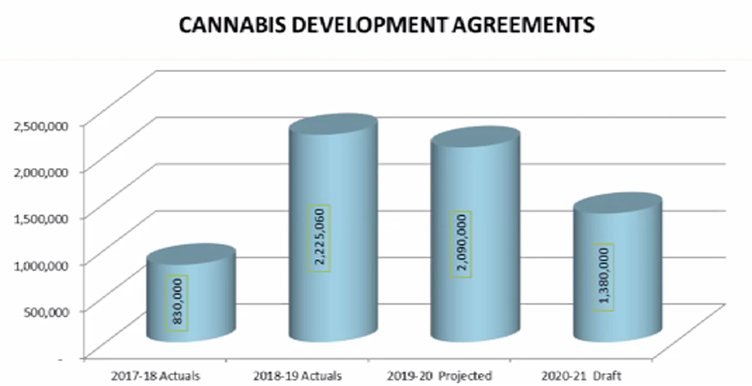With the local cannabis market becoming more competitive since it opened in January 2018, Kase’s Journey dispensary in Ceres was approved Monday to operate under a lower fee structure.
The Ceres Planning Commission approved changes to the developer agreement with Mike Reynolds which will result in less money paid to the city. The three-year term of the agreement will be expanded to 10 years. The agreement will also allow Kase’s Journey to begin making deliveries of product, as is allowed by the state Bureau of Cannabis Control allowing delivery from cannabis retailers.
The 4,000-square-foot retail cannabis dispensary is located in an industrial park at 4030 Farm Supply Drive in Ceres.
The proposed Public Benefit Fee payment terms were based on a fixed amount per year and is now moving to a base amount of $20,000 per month or five percent of gross receipts, whichever is greater, and sets a cap of $70,000 per month as the maximum fee paid to the city. The gross receipts factor is modeled on a similar framework used by the state for tax purposes.
The previous agreements required payment to the city of a monthly fee of $40,000 if the firm earned $500,000 or less in gross receipts per month. The fee increased to $50,000 per month for gross receipts between $500,001 and $800,000; $75,000 per month for sales of $800,001 to $1.1 million; and $100,000 monthly for sales more than $1,100,001.
The changes must also be approved by the Ceres City Council.
“Over the last three years I think we’ve established a lot of the doubts and concerns of an unknown in an unknown world with cannabis coming into Ceres,” said Reynolds. He added that only two calls for service have been placed regarding his dispensary since opening and they were false alarm calls.
“I think we’ve been a good community partner … and showed that we could do what we said we were going to do and continue to not impact the city,” said Reynolds.
Commission Chairwoman Laurie Smith told Reynolds “we appreciate that you’re located here in Ceres and that you’re willing to commit for another 10 years. Obviously there’s so much that has developed out of this since three years ago.”
She said the city enjoys the financial support from his businesses in an “industry that is clearly growing and changing and adapting.”
Earlier this year the council approved changes to the agreement that allows Pacafi Cooperative, Inc., to pay less in fees to operate its Patient Care First dispensary at 1442 Angie Avenue in Ceres.
In April the city also amended its developer agreements with Reynolds who also operates Kase Manufacturing in Ceres. The three-year agreement with Kase expired and was replaced with a new agreement for a period of five years with the fee paid to the city “more reflective of the current cannabis business market conditions,” according to a city staff report. At that time Reynolds asked for his manufacturing operation to be subjected to decreased fees, he told the city: “We took a blind guess on the amount of money that we would pay per month. Knowing where the cannabis industry was at then to where it is now has drastically changed.” He added that if he had to continue paying $100,000 per month the city could count on no revenue “because I wouldn’t be able to stay open.” He noted that the cannabis market crashed in October and November 2019 “because you have a lot of bad actors and you have a lot of people who aren’t playing by the rules.”
He said with a floor of $25,000 or 5 percent, the city was still getting a generous deal given that some cities settle for as low as three percent.
Since the developer agreements were inked in 2017, the dispensaries were only selling cannabis to “patients” with medical cards. They later began selling recreational marijuana after California voters approved recreational cannabis use among adults. In the past three years, other jurisdictions like the city of Turlock and Stanislaus County also followed Ceres’ example and began allowing dispensaries, which have cut into sales.
Cannabis operations netted the city $2.25 million during the 2018-19 fiscal year and are expected to drop to $1.38 million for 2020-21.





